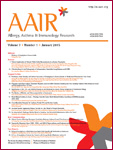
Allergy Asthma & Immunology Research
Scope & Guideline
Advancing knowledge in Allergy, Asthma, and Immunology.
Introduction
Aims and Scopes
- Allergic Diseases Research:
The journal investigates various allergic conditions such as atopic dermatitis, food allergies, and allergic rhinitis, exploring their pathophysiology, risk factors, and management strategies. - Asthma Pathophysiology and Management:
Research on asthma encompasses its various phenotypes, mechanisms, and the efficacy of treatments, especially biologics and new therapeutic approaches. - Immunological Mechanisms:
Studies focus on the immune system's role in allergies and asthma, including the interplay between different immune cells and the impact of genetics and environmental factors. - Biomarkers and Predictive Models:
The journal emphasizes the identification of biomarkers for diagnosis, prognosis, and treatment response in allergic diseases and asthma, including novel predictive models. - Therapeutic Innovations:
Research on new therapeutic strategies, including biologics, immunotherapy, and dietary interventions, aimed at improving management and outcomes for patients with allergies and asthma.
Trending and Emerging
- Biologics and Targeted Therapies:
There is a significant trend towards exploring the efficacy and safety of biologic therapies in severe asthma and allergic conditions, indicating a shift towards more targeted treatment strategies. - Microbiome and Allergic Diseases:
Research into the gut and nasal microbiome's role in the development and management of allergic diseases is gaining momentum, reflecting a growing interest in the microbiome's impact on immune responses. - Artificial Intelligence in Allergy and Asthma:
Emerging studies are utilizing artificial intelligence and machine learning for diagnostic purposes and treatment prediction, showcasing innovative approaches to allergy and asthma management. - Longitudinal and Real-World Studies:
An increase in longitudinal and real-world studies highlights the need for data that reflect actual patient experiences and treatment outcomes outside of controlled clinical trials. - Environmental Influences on Allergic Diseases:
There is a rising focus on how environmental factors, including pollution and climate change, affect the prevalence and severity of allergies and asthma, indicating a broader public health perspective.
Declining or Waning
- Traditional Pharmacological Treatments:
As the focus shifts towards biologics and precision medicine, traditional pharmacological treatments for asthma and allergies are receiving less attention in recent publications. - Animal Models of Allergy:
While animal models have historically played a crucial role in understanding allergic diseases, there seems to be a decline in studies emphasizing these models in favor of human-centric research. - Generalized Allergy Management Guidelines:
There is a noticeable reduction in papers discussing broad allergy management guidelines, as more research is focusing on personalized and targeted approaches tailored to individual patient needs.
Similar Journals

AIMS Allergy and Immunology
Pioneering Insights for Immune HealthAIMS Allergy and Immunology is a prestigious open access journal dedicated to advancing knowledge in the fields of allergy and immunology. Published by the American Institute of Mathematical Sciences (AIMS), this journal provides a vibrant platform for researchers, practitioners, and scholars to share groundbreaking findings and insights. Recognized for its commitment to disseminating high-quality research since its inception in 2017, AIMS Allergy and Immunology contributes significantly to the understanding of complex immunological mechanisms and allergic responses, thus playing a pivotal role in enhancing clinical practices and therapeutic strategies. With its ISSN 2575-615X, the journal aims to facilitate a robust exchange of ideas and promote collaboration within the scientific community. Researchers and practitioners are encouraged to access the latest studies and reviews, which are all freely available online, ensuring that vital information reaches a global audience without barriers. Together, we can tackle the challenges posed by allergies and immune disorders through rigorous scientific inquiry and innovation.
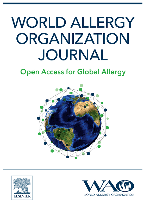
World Allergy Organization Journal
Innovating Solutions for Allergic Diseases WorldwideWorld Allergy Organization Journal is a premier open-access publication dedicated to advancing the understanding and treatment of allergic diseases and related conditions. Published by ELSEVIER, this journal boasts a commendable impact factor and ranks in the second quartile for both Immunology and Allergy, as well as the first quartile in Pulmonary and Respiratory Medicine. Since its inception as an open-access journal in 2008, it has consistently aimed to provide a credible platform for researchers, clinicians, and students to disseminate original research, reviews, and clinical studies. With its emphasis on high-quality scholarship and practical applications, the World Allergy Organization Journal plays a crucial role in bridging theoretical knowledge with clinical practice, making significant contributions to the fields of immunology, allergy, and respiratory medicine. The journal is particularly notable for its accessibility to a global audience, exemplified by its open-access model since 2008, promoting a wider exchange of ideas and innovations across borders.

Allergo Journal
Advancing knowledge in Immunology and Allergy.Welcome to the Allergo Journal, a pivotal publication in the field of Immunology and Allergy, housed under the esteemed SPRINGER HEIDELBERG publishing house. With an ISSN of 0941-8849 and E-ISSN 2195-6405, the journal has been serving the scientific community since its inception in 1994. Although its Scopus coverage was discontinued in 2017, the journal remains significant, ranked #135 out of 186 in its category and positioned in the 27th percentile, reflecting its contributions to vital research in allergy and immunological disorders. While the journal is not an open access publication, it continues to provide a platform for rigorous academic discourse and advances in the study of allergens and immune response. The Allergo Journal stands as a crucial resource for researchers, professionals, and students dedicated to deepening their understanding of allergies and immunology, fostering advancements in therapy and comprehensive patient care.
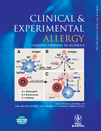
CLINICAL AND EXPERIMENTAL ALLERGY
Unraveling the Complexities of Allergy ScienceCLINICAL AND EXPERIMENTAL ALLERGY is a premier peer-reviewed journal dedicated to advancing the scientific understanding of allergy and immunology. Published by Wiley in the United Kingdom, this esteemed journal maintains a significant impact factor, reflecting its high standards and influential research contributions. With an impressive history since its inception in 1971, the journal is poised to continue leading the discourse in the field until at least 2024. It is ranked in the Q2 quartile for both Immunology and Allergy categories, further highlighting its reputable standing within the academic community. The journal's Scopus rankings showcase its academic relevance, securing the 49th and 51st positions in the Medicine and Immunology categories, respectively. Researchers, professionals, and students will find vital insights and contemporary research trends within its pages, making it an essential resource for those invested in understanding and addressing allergic diseases and disorders.
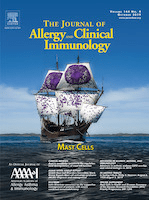
JOURNAL OF ALLERGY AND CLINICAL IMMUNOLOGY
Fostering scientific dialogue for a healthier tomorrow.JOURNAL OF ALLERGY AND CLINICAL IMMUNOLOGY, published by MOSBY-ELSEVIER, stands as a leading peer-reviewed journal dedicated to advancing the understanding of allergies and immunological conditions. With a notable impact factor and a prominent stature in the academic community, it ranks in the Q1 category for both Immunology and Allergy in 2023, reflecting its significance and high citation rates among researchers. Since its establishment in 1963, the journal has fostered scientific discourse and innovation in the field, positioning itself as an essential resource for both seasoned professionals and emerging scholars. The Scopus rankings underscore its influence, being ranked 12th out of 233 in Immunology and Allergy and 15th out of 236 in Immunology and Microbiology, placing it in the top centile of both categories. The journal aims to disseminate cutting-edge research, reviews, and clinical studies that deepen our understanding of allergic diseases and enhance patient care. While not an open access journal, it provides institutions and individuals with opportunities to stay informed on crucial advancements in the immunological sciences.

Journal of Cutaneous Immunology and Allergy
Fostering collaboration for a deeper understanding of skin-related allergies.The Journal of Cutaneous Immunology and Allergy, published by FRONTIERS MEDIA SA in Switzerland, is an esteemed Open Access platform dedicated to advancing research in the intersecting fields of dermatology, immunology, and allergy. Since its inception in 2018, this journal has provided a vital resource for the dissemination of innovative research findings and critical reviews, enhancing our understanding of cutaneous conditions related to immune responses. Although currently classified in the Q4 quartile in both Dermatology and Immunology & Allergy categories as of 2023, the journal continues to strive for recognition within the scientific community, encouraging collaboration and knowledge sharing among researchers, clinicians, and experts. The journal boasts an E-ISSN of 2574-4593 and is committed to making high-quality research freely accessible to all, thus fostering greater insights into the complexities of skin-related immune disorders. Join us in this journey to explore the forefront of cutaneous research and contribute to the evolving dialogue in this dynamic field.

ASIAN PACIFIC JOURNAL OF ALLERGY AND IMMUNOLOGY
Exploring breakthroughs in immunological disorders.The ASIAN PACIFIC JOURNAL OF ALLERGY AND IMMUNOLOGY, published by the Allergy Immunology Society of Thailand, is a pivotal platform for disseminating high-quality research in the fields of allergy and immunology. Established in 1983, this journal has consistently evolved to address the pressing challenges and advancements in these dynamic disciplines, contributing significantly to the global scientific community's understanding of immunological disorders. With a category ranking of Q3 in Immunology and Allergy, and Q2 in Medicine (miscellaneous) for 2023, the journal stands at the forefront of impactful research, engaging with a diverse audience of researchers, clinicians, and students alike. Although it operates on a non-open access model, its rigorous peer-review process ensures that published articles meet the highest academic standards. Located in Bangkok, Thailand, the journal connects researchers across the Asia-Pacific region, fostering collaboration and innovation to enhance patient care in the realm of allergy and immunology.
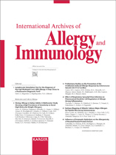
INTERNATIONAL ARCHIVES OF ALLERGY AND IMMUNOLOGY
Connecting Researchers and Clinicians in Allergy Science.INTERNATIONAL ARCHIVES OF ALLERGY AND IMMUNOLOGY, published by KARGER, is a distinguished journal dedicated to advancing the field of immunology and allergy research. With an ISSN of 1018-2438 and an E-ISSN of 1423-0097, this journal has been a vital resource since its inception in 1950, continuing to publish influential articles through 2024. Hailing from Switzerland, it holds an important position within the Q3 category in Immunology and Allergy and Q2 in miscellaneous Medicine, reflecting its growing impact in the scientific community. The Scopus rankings showcase its relevance, with a 52nd percentile in Immunology and Allergy and 45th in Immunology and Microbiology. Although not an open-access journal, it plays a critical role in disseminating significant findings and innovations in the understanding of allergic diseases and immunological responses. The INTERNATIONAL ARCHIVES OF ALLERGY AND IMMUNOLOGY is essential for researchers, clinicians, and students eager to stay at the forefront of allergy and immunology developments.
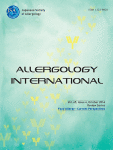
ALLERGOLOGY INTERNATIONAL
Connecting scholars to combat allergic diseases.ALLERGOLOGY INTERNATIONAL is a prestigious, peer-reviewed journal dedicated to advancing the field of immunology and allergy research. Published by the Japanese Society of Allergology, this Open Access journal has been democratizing knowledge since 1996, providing a platform for the latest findings and clinical practices in the management of allergic diseases. Its impressive Q1 ranking in both Immunology and Allergy** and **Medicine (miscellaneous)** categories in 2023 highlights its significance in the global scientific community, with a commendable Scopus ranking of #31 out of 233 in the field of immunology. The journal's focus on innovative research, comprehensive reviews, and case studies ensures that it remains a vital resource for researchers, healthcare professionals, and students alike. Situated in Tokyo, Japan, it continues to bridge gaps in allergy-related health information and foster international collaboration among scholars.
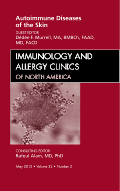
IMMUNOLOGY AND ALLERGY CLINICS OF NORTH AMERICA
Fostering Excellence in Immunological ResearchIMMUNOLOGY AND ALLERGY CLINICS OF NORTH AMERICA is a premier journal published by W B SAUNDERS CO-ELSEVIER INC, focusing on the dynamic fields of immunology and allergy. With an ISSN of 0889-8561 and an E-ISSN of 1557-8607, this journal has consistently ranked in the Q2 category in both Immunology and Immunology and Allergy as per 2023 metrics, underscoring its critical role in academia. It provides cutting-edge research, comprehensive reviews, and practical insights that cater to the needs of researchers, clinicians, and students alike. Though the journal is not open access, it remains an essential resource for those involved in advancing knowledge and clinical practice in allergy and immunology. With its converged years stretching from 1987 to 2024, the journal serves as a rich repository of scientific advancements, fostering progress in diagnosis, treatment, and prevention of allergic diseases and immune disorders. Positioned within the United States and based in Philadelphia, it plays a vital role in promoting scholarly communication within these impactful fields.